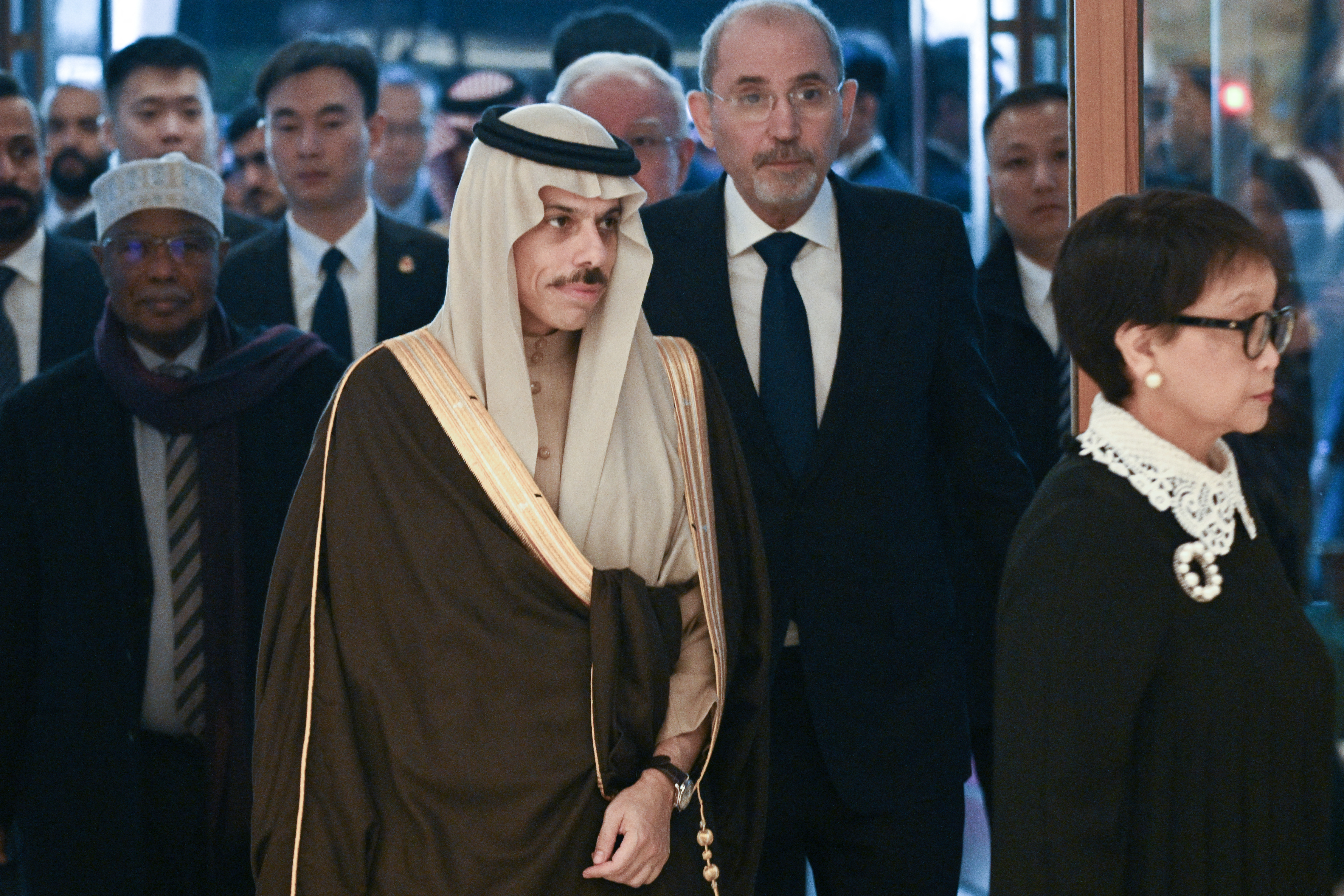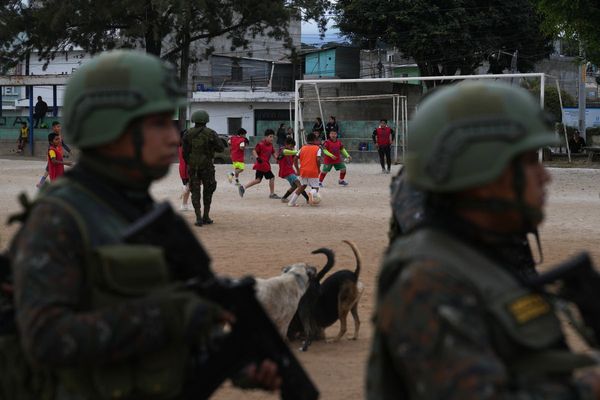
Beirut, Lebanon – A delegation of Islamic and Arab nations are on a tour of the five permanent United Nations Security Council member states.
Their stated goal is to bring a ceasefire to the war on Gaza, allow more humanitarian aid to reach the people there and ask the five council members to support the Palestinians in achieving an independent state.
But experts are divided on the efficacy and format of this trip.
‘The impression of activity’?
The delegation, formed at a summit of the Arab League and Organisation of Islamic Cooperation (OIC) in Riyadh, includes representatives from Egypt, Indonesia, Jordan, Nigeria, the Palestinian Authority, Qatar, Saudi Arabia, Turkey and the secretary-general of the OIC. It rejects Israel’s claim that its assault on Gaza is in self-defence.
On October 7, Hamas attacks in southern Israel killed about 1,200 people. About 240 people were taken captive. Since then, Israel has killed more than 14,500 Palestinians. At least 6,000 were children.
The delegation has a packed schedule and started its tour in China, where it met with Wang Yi, China’s top diplomat, on Monday in Beijing.
Starting with China surprised analysts who speculated on what the delegation was trying to signal to Western powers. Some were less concerned with that and questioned the delegation’s true agenda.
“In diplomacy, it is a well-known strategy: When you don’t want to do anything, try to involve the maximum of actors,” Gerard Araud, former French ambassador to Israel, posted on X, formerly known as Twitter. “It takes time, it gives the impression of activity and it is useless.”
Shortly after the delegation began its visit, talk of a humanitarian pause gathered steam, and early on Wednesday, it as announced. The deal was a major talking point for the delegation, and they pushed for a more lasting cessation of hostilities.
The agreement would see Hamas release about 50 women and children for three times as many Palestinian female and child prisoners in Israeli jails.
The announced duration of the pause is four days, over which the captives will be released. Israel also said it would halt fighting for one more day for every “extra” batch of 10 captives Hamas releases.
The meeting in China was followed by one with Russian Foreign Minister Sergey Lavrov in Moscow on Tuesday and the UK’s foreign secretary, David Cameron, later in London. Wednesday saw a meeting with French President Emmanuel Macron.
First stop, China
By starting their trip in China, the Islamic and Arab states may be trying to gather global support to present to nations that have backed Israel so far.
During the meeting, Wang said China being chosen as the first stop is an indication that the countries of the delegation trust China and appreciate the mutual understanding between them.

Robert Mogielnicki, an expert at Georgetown University on Chinese relations with Middle Eastern and North African countries, does not consider the efforts by Saudi Arabia and other Arab states performative as Araud does.
“Arab states do not have a tremendous degree of direct leverage. Indirect influence through shaping the global narrative … and impacting public stances of key global players seem to be an important dimension of their efforts,” he said.
China seemed to welcome the diplomacy with Wang telling the delegation: “China has always … firmly supported the just cause of the Palestinian people to restore their legitimate national rights and interests,” according to the Chinese Ministry of Foreign Affairs.
“China has an interest in regional order and preventing economic turbulence,” Arang Keshavarzian, an associate professor of Middle Eastern and Islamic Studies at New York University, told Al Jazeera.
“I can only assume these leaders are genuinely trying to get China more involved to help end the war, but the reality is that only the US has the necessary leverage over Israel.”
‘Message to the US’
In August, China brokered a peace deal between Iran and Saudi Arabia, which re-established their diplomatic ties and had analysts saying it was a sign that the Middle East was turning away from the United States as a major ally.
“China being the first destination visited is a message to the United States,” Randa Slim, senior fellow at the Middle East Institute, told Al Jazeera. Saudi Arabia and other Arab states are telling the US, “you are no longer the sole power in the region,” she explained.
Beijing recently also strengthened its relations with non-Western multilateral groups like BRICS, in which it is a member along with four other large emerging economies, and built stronger ties with the Global South in what analysts said are efforts to build a more multipolar world order.
The Saudi-Iran deal was a “diplomatic win for China as it increasingly seeks to present an alternative vision to the US-led global order”, according to a report by the US Institute of Peace.
Abraham Accords or bust?
Arab leaders have complained about US disengagement from the region in recent years. Its policy has largely focused on following former President Donald Trump’s strategy of pushing the Abraham Accords, normalisation agreements between Israel and Arab countries.
Arab leaders – Egypt and Saudi Arabia in particular – recently warned US Secretary of State Antony Blinken that this strategy has contributed to instability in the region.
Before October 7, it was widely reported that Saudi Arabia and Israel were on track to normalise relations as well. The deal would have been a major coup for Israel, who, analysts said, has been looking to circumvent working with Palestinians by building agreements with regional powers instead.
Popular mobilisation in support of Palestinians over the past six weeks, particularly in the Middle East, “upended” the “regional dynamics underpinning normalisation processes”, Mogielnicki said.
However, he added: “The underlying strategic calculations that have supported past normalisation-related efforts are unlikely to disappear entirely.”
Public perception of the US as a staunch ally of Israel – despite Blinken and other US officials highlighting policies like restoring aid to Palestinians that the Trump administration had cut – may not change.
Even if Arab states are under no illusion about where the US stands, the visit to China does not indicate a complete loss of faith just yet.
“This is part of efforts to galvanize global support … and increase pressure on the Israeli government,” Mogielnicki said.
Regardless of how frustrated they are with the unflinching US support for Israel, Arab leaders know the power to stop the carnage rests with the US.
“If you want to achieve the objective of getting a ceasefire, you need to speak to the Americans,” Slim said. “They are the only party [who decides].”







